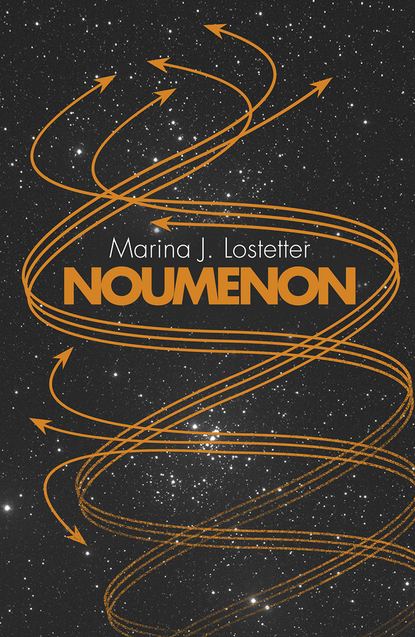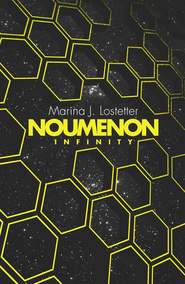По всем вопросам обращайтесь на: info@litportal.ru
(©) 2003-2024.
✖
Noumenon
Настройки чтения
Размер шрифта
Высота строк
Поля
“Care to elaborate?”
“We on the design teams think each research division could use its own ship,” Akane jumped in. “And then there are the supplies. It’s not practical to make each ship entirely self-sustaining, what with the number of crew members the consortium wants the convoys to consist of: sixty to one hundred thousand. So, while some food and water, etcetera, will be kept aboard each ship, the majority of the supplies will have to be stored and maintained separately. Otherwise we’d need ships larger than we can currently build.”
“One hundred thou … That’s—that’s over a million people. Twelve convoys and a million people,” Dr. Dhiri said. “They want to send one million people into space? Where are they going to find that many volunteers—expert volunteers? Do they want to send as many of our scientists, engineers, and thinkers off-world as they can, and hope everyone else picks up the slack?”
Reggie and Akane shared a look. “I know,” said Reggie, lapping at a smear of buttercream at the corner of his mouth. “I thought it sounded crazy, too. Before I talked to Matheson and learned exactly what the consortium has in mind.”
All eyes turned to Matheson. He sobered up quickly. “Um, yeah. My preproject research focused on social stability in isolated societies. And what’s more isolated than a bunch of self-contained space cans, am I right? Obviously there are thousands of factors that go into societal consistency, but one is size. Size in terms of both population and area. If you have too many people in a small area, you get claustrophobic reactions. Too few people in too large an area and you get subgroups, like rival tribes.
“What we want is a single, united convoy. But not a trapped convoy—that’s why the social practicality of several ships outweighs the engineering practicality of trying to cram it all into one space. People need to feel like they can move or else they start feeling like they’re prisoners; like they’re entombed. The multiple ships and the ability to travel between them will give them a sense of range and movement unachievable otherwise.
“It’s more than that, though. Because while the crew members will be divided by department, we don’t want them to become competitive. That’s why it’s essential there be a home base—a place everyone thinks of as the place they collectively belong. A unifying location, if you will. That means a ship whose sole purpose is housing. Then each research division gets its own ship. And finally, there’s got to be a ship fully dedicated to resources—food and water processing. Specialization will ensure each ship be tailored for optimum efficiency. No worries about making it suitable for multipurpose.”
“Okay,” interrupted Dhiri, “but what does that have to do with a crew of one hundred thousand? Wouldn’t it work just as well with ten thousand? Or two hundred?”
C spoke up. “According to the files I have marked Scale Studies one through sixty-three, two hundred people would be thirty-seven percent more likely than ten thousand to incur full crew psychological breakdown, which may lead to hallucination, mutiny, and murder. It is the perfect size for a mob.”
“Like the PA says: No,” said Matheson. “Not for our purposes. It’s all about checks and balances. You need a certain number of people in order to put pressure on those who might be disruptive. And a certain number of people to compensate if something drastic happens.
“We have to remember that the crew members aren’t from a society that’s always been isolated. Their group will have been dramatically severed from its parent culture, and they will be fully aware of that parent culture and what they’re not getting from it. Psychologically, they will go through identity crises. This could potentially tear them apart, but we’ll be giving them every opportunity to band together.”
“More people equals a greater shared identity,” Reggie added. “It means for each person who wants to reject the situation, there should be hundreds who can apply direct pressure to accept the situation.”
“And the nine ships should give such a large population enough room to roam,” said C. Blue digital wire skeletons lit up on the wall, revealing distances from end-to-end for each ship as well as all available passenger floor space.
“But how do you know there’ll be an acceptable internal-breakdown to external-pressure ratio? What if they all get cabin fever and start clawing at the walls? Madness can feed madness,” said McCloud. He wiped the corner of his mouth with his hanky.
“That does pose a problem. Along with the sheer number of volunteers it would take. But we think we’ve found a solution. Success is still not guaranteed, but it ups our chances considerably.” Though his tone carried confidence, Matheson paused and scratched his chin, hesitant to continue.
“A solution, yes.” Nakamura nodded, but didn’t look happy. “A controversial one.”
“Eighty-six percent of experts presented with this idea rejected it outright upon initial suggestion,” said C.
“Are you going to tell us what it is, or do we have to keep listening to this saying-without-saying, nonconversation?” McCloud asked.
“The solution—”
“To give you a half answer, Professor: genetics,” Reggie said, temporarily hitting mute on the PA’s feed, cutting C off. “The crew has been chosen based largely on their DNA and histones. On top of that, the consortium is getting full psych evals and family histories. There are predispositions that have been left out. Those with violent tendencies won’t be aboard, or those who lack loyalty, or those who are flighty—”
“No anarchists allowed, eh?”
Reggie nodded. “Or dictators, or psychopaths, misogynists, etcetera. No matter how intellectually brilliant they are, without the proper emotional factors—emotional intelligence, if you will—they will hinder societal stability, and could endanger the mission’s success.”
“Utopia?” McCloud ventured.
“I doubt it. But hopefully less chance of dystopia.”
“Interesting.” McCloud lost himself in thought for a moment. “So, if we’re discussing stability and assuring positive interactions, that must mean the consortium intends for the crew—the entire crew—to be awake at all times? No automated birthing systems for a payload of frozen embryos or the like?”
“Right. I supported the mech-based auto-birth option, but they’ve since rejected it. Said the risk of malfunction and mission failure were too high.” Reggie shrugged.
The old professor was clearly determined to hold on to his skepticism. “A hundred thousand people, all awake, all volunteers—no embryos—all as stable intellectually and emotionally as we can screen for, right?”
“That’s the plan,” Matheson said.
“And how does the consortium propose to get all these lovely people in one place?”
“There are no guarantees,” Reggie said. “It’s not foolproof.”
“Is anything?” chimed in Nakamura.
“Exactly,” Reggie said.
McCloud glanced between them, cynicism furrowing his brow. “The geneticists have their work cut out for them. What, do they expect to test all nine billion of us on the planet and just hope they end up with the right number of volunteers with the right set of traits?”
“That’s why I love you, professor,” said Reggie, slapping the old man’s shoulder.
“Because I bring the obvious to the table?”
“Exactly,” he said again, this time with a wink. “If we allow generations to pass, we can’t control who the convoy carries for the majority of its journey. We’re being denied frozen embryos, and we don’t have the technology to freeze and thaw adults. We also can’t be assured the consortium will find one million people who fit their remarkably narrow criteria. So, what’s the answer?”
“I don’t like riddles,” McCloud said. “Clearly you, Matheson, and Nakamura here already know what’s happening, so spit it out.”
Nakamura bowed her head graciously. “I apologize, but you must understand our hesitancy to … It won’t be announced publicly for years. The consortium doesn’t want the real plan out yet, because public knowledge could equal complications. There’s a bit of a moral dilemma surrounding their top option.”
“Which is?” McCloud leaned in.
She looked to Reggie, and he nodded reassuringly, adding, “He’ll stay quiet. If not, I know where to find him.”
She turned back to McCloud. “They want to send clones.”
Reggie unmuted C, who immediately said, “Isn’t that interesting?”
MAY 29,-26 LD
2099 CE
When Reggie stepped out of customs at London Heathrow, C exclaimed, “He’s over there, over there!”
Reggie had his phone synced with his implants. As his eyes scanned the crowd—passing over families decked out in Union Jack T-shirts, business people in gray suits, and security guards with drug-sniffing dogs—C had run a facial recognition app for its creator: Jamal Kaeden.
Reggie waved at the man C indicated, and the two swam through the throngs, dodging baggage carts and people too focused on their implants to watch where they were going. Jamal was only perhaps half a foot taller than Reggie, but his lankiness gave the impression that he was a tower of a man. Neatly sheared dreadlocks were gathered in a ponytail at the base of his neck. He smiled broadly while they shook hands, and his smile shone bright white in his dark face.
“And this is C,” Reggie said, holding up his phone to display the open PA avatar. C presented as a shifting green-and-purple fractal design. While the system allowed the user to set whatever avatar they wanted from an extensive list of customizable displays—everything from human faces to insects to galaxies—Reggie had let C choose its own form.
“All right, C?” Jamal greeted the program, but then looked at Reggie quizzically. “You didn’t rename it? C is just its personality type indication—you’re supposed to call it whatever you want.”
“Oh, I know. I had a hard time coming up with one, though, and it seemed happy enough referring to itself as C, so I left it. Not very creative of me.”






